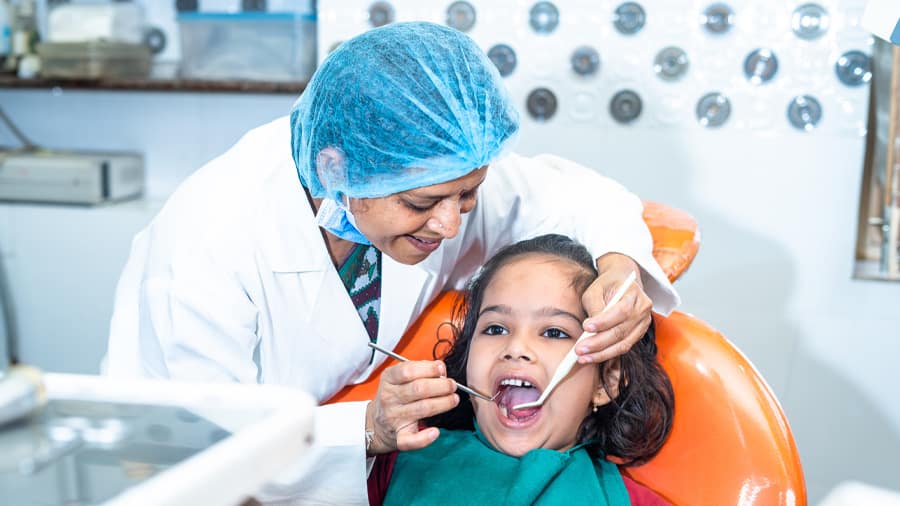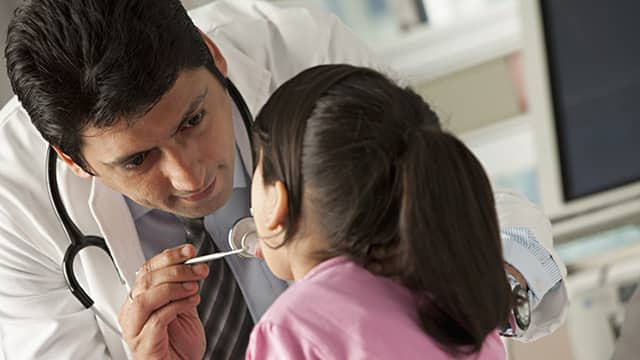When Does Teething Start?
The first tooth generally appears around the age of 6 months, although the general age range for the eruption of the first tooth is 3 to 14 months of age. Some children erupt one tooth at a time, while others have teeth that come in pairs or sets. The Indian Dental Association provides a great tooth eruption chart, but not all children conform to this schedule of tooth development. The Indian Dental Association suggests that a child should visit the dentist within 6 months following the eruption of his or her first tooth, or upon his or her first birthday. This being said, if a child does not have a tooth by age one, his or her parents can discuss tooth development in greater detail with the pediatric or general dentist.
Signs My Baby Might Be Teething
Contrary to some old wives' tales or what "grandma says," there are no universal signs of teething. Fever, runny nose and diarrhea have been mistakenly linked to teething by more than one parent. None of these symptoms have scientific evidence to support the claim. Following are the signs of teething and it varies from child to child. Some babies may feel no pain, while others exhibit pain and tenderness that linger for several weeks; depending on the speed at which the tooth erupts.
A baby may exhibit one or more of the following signs that indicate teething:
- Profuse drooling
- Swollen gum tissue with or without a visible "lump"
- Repeatedly rubbing his or her eyes, cheek or ears
- Refusing food or bottle when attempts are made to feed baby
- Crankiness
- Inability to sleep/restlessness during usual nap time
- Consistent urge to chew on solid items
Upon reading this list, parents can observe that these signs may mean other things, but the combination of two or more of these symptoms more than likely indicates a teething baby.
How to Treat Teething Pain
Fortunately, many methods exist for teething treatment. Over-the-counter pain-relief medicines including ibuprofen or acetaminophen may help to dull the pain. Numbing compounds containing topical benzocaine (similar to the gel used by dental professionals) are available, but some research indicates these should be used in great moderation as they may affect the baby's blood oxygen levels.
Other teething soothers include a refrigerated baby teething ring or using a clean finger to apply pressure on the gums may transmit a feeling of relief for baby. Avoid giving baby hard food to chew on, as it may pose a choking hazard. A warm bath and gentle rocking may also help to calm and relax the child.
Caring for the New Tooth
Using a clean wash cloth to gently cleanse baby's mouth is a good habit to get into, even before the first tooth arrives. Toothpaste is not as important in these early stages as the mechanical removal of bacteria. At baby's first dental appointment, the dental professionals will guide parents through the steps in caring for baby's teeth and gums. Questions are always welcomed at this appointment because caring for a child's teeth is a partnered effort between the parents and the dental office.
This article is intended to promote understanding of and knowledge about general oral health topics. It is not intended to be a substitute for professional advice, diagnosis or treatment. Always seek the advice of your dentist or other qualified healthcare provider with any questions you may have regarding a medical condition or treatment.
ORAL HEALTH QUIZ
What's behind your smile?
Take our Oral Health assessment to get the most from your oral care routine
ORAL HEALTH QUIZ
What's behind your smile?
Take our Oral Health assessment to get the most from your oral care routine





.jpg)







